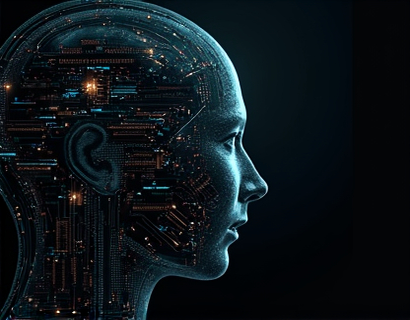Revolutionizing User Engagement: The Synergy of Crypto and AI in the Digital Age
The intersection of cryptocurrency and artificial intelligence (AI) is ushering in a new era of digital innovation, fundamentally transforming user engagement across various platforms and applications. This synergy is not just about combining two cutting-edge technologies but about creating a seamless, secure, and highly personalized digital experience. As we delve into the latest advancements, it becomes evident that the integration of crypto and AI is redefining how users interact with digital content, driving unprecedented growth and engagement in the tech landscape.
The traditional models of user engagement are being reimagined through the lens of blockchain technology and machine learning. Blockchain provides a decentralized, transparent, and secure framework, while AI brings intelligence, adaptability, and predictive capabilities to the table. Together, they offer a powerful toolkit for developers and businesses aiming to enhance user experiences and foster meaningful connections.
Enhanced Security and Trust
One of the primary benefits of integrating cryptocurrency with AI is the enhancement of security and trust. Blockchain's inherent properties ensure that transactions are immutable and verifiable, reducing the risk of fraud and data breaches. AI, with its advanced analytics and pattern recognition, can further bolster security by detecting and mitigating potential threats in real-time. This dual approach not only protects user data but also builds a higher level of trust, encouraging more users to engage with digital platforms.
For instance, AI-driven security protocols can monitor user behavior and identify anomalies that may indicate malicious activity. By combining this with the transparency of blockchain, any suspicious transactions can be flagged and addressed promptly. This level of security is crucial for applications handling sensitive information, such as financial services, healthcare, and personal data management.
Personalized User Experiences
AI's strength lies in its ability to analyze vast amounts of data and derive actionable insights. When applied to user engagement, AI can create highly personalized experiences tailored to individual preferences and behaviors. By leveraging machine learning algorithms, platforms can understand user patterns, predict future actions, and deliver content that resonates with each user. This personalization not only increases user satisfaction but also boosts engagement and retention rates.
For example, a streaming service can use AI to analyze a user's viewing history, preferences, and even real-time mood to recommend content that is most likely to keep them engaged. Similarly, an e-commerce platform can use AI to suggest products based on past purchases and browsing behavior, enhancing the shopping experience and driving sales.
Decentralized Reward Systems
The integration of cryptocurrency into AI-driven platforms introduces decentralized reward systems that incentivize user participation and engagement. By using tokens or coins as rewards, these systems can motivate users to contribute valuable data, participate in community activities, or complete specific tasks. This not only enhances user engagement but also creates a more interactive and dynamic community.
For instance, a social media platform can implement a token-based system where users earn tokens for creating high-quality content, engaging in discussions, or referring new users. These tokens can then be used to access premium features, purchase merchandise, or even traded for other cryptocurrencies. This approach not only encourages active participation but also fosters a sense of ownership and community among users.
Predictive Analytics and User Behavior Modeling
AI's predictive analytics capabilities are invaluable in understanding and predicting user behavior. By analyzing historical data and real-time interactions, AI can forecast user actions and preferences, allowing platforms to proactively enhance the user experience. This predictive insight can be used to optimize content delivery, improve user interface design, and tailor marketing strategies.
For example, an online learning platform can use AI to predict which courses a user is most likely to enroll in based on their past behavior and interests. The platform can then send personalized recommendations and promotional offers, increasing the likelihood of conversion. Similarly, a fitness app can predict when a user is likely to skip a workout and send motivational messages or adjust the workout plan to keep them engaged.
Fraud Detection and Prevention
Fraud remains a significant concern for digital platforms, especially those handling financial transactions or sensitive user data. AI, combined with blockchain, offers robust solutions for fraud detection and prevention. AI algorithms can analyze transaction patterns and user behavior to identify anomalies and potential fraudulent activities. When integrated with blockchain's immutable ledger, these systems can ensure that any suspicious activity is immediately detected and addressed.
For instance, a financial app can use AI to monitor transactions in real-time, flagging any unusual activity such as multiple failed login attempts or large transactions from unfamiliar locations. The blockchain ledger can then provide a transparent and tamper-proof record of all transactions, making it easier to trace and prevent fraudulent activities.
Enhanced Customer Support through Chatbots
AI-powered chatbots are revolutionizing customer support by providing instant, personalized assistance to users. These chatbots can understand natural language, learn from interactions, and adapt to user preferences over time. When integrated with blockchain, chatbots can ensure secure and private communication, further enhancing user trust.
For example, a customer support chatbot can handle a wide range of queries, from account management to product information, 24/7. By using AI to analyze past interactions, the chatbot can provide more accurate and relevant responses, reducing customer frustration and improving satisfaction. Additionally, blockchain can ensure that user data used by the chatbot is securely stored and managed, complying with privacy regulations.
Data Privacy and User Control
Data privacy is a growing concern for users, and the combination of cryptocurrency and AI offers solutions to enhance user control over their data. Blockchain's decentralized nature allows users to have greater control over their personal information, deciding who can access it and for what purpose. AI can facilitate this by providing tools and interfaces that empower users to manage their data preferences and consent settings.
For instance, a user can use an AI-driven dashboard to view and control which apps and services have access to their data, revoke permissions when needed, and receive notifications for any data access attempts. This level of control not only enhances privacy but also builds trust, encouraging users to engage more freely with digital platforms.
Innovative Monetization Models
The integration of cryptocurrency and AI opens up new monetization models that can benefit both platforms and users. Token-based economies can create sustainable revenue streams through various mechanisms such as subscription models, in-app purchases, and advertising. AI can optimize these models by analyzing user behavior and preferences to offer targeted and relevant monetization opportunities.
For example, a content creation platform can use AI to identify high-engagement content and offer creators the option to monetize it through token sales. Viewers can purchase tokens to support their favorite creators, creating a direct and transparent reward system. This not only incentivizes high-quality content creation but also ensures that creators receive fair compensation for their work.
Challenges and Considerations
While the potential benefits are significant, the integration of cryptocurrency and AI also comes with challenges that need to be addressed. Regulatory compliance is a major concern, as the crypto space is still evolving and subject to varying regulations across different regions. Ensuring compliance while leveraging the full potential of these technologies requires careful navigation and ongoing monitoring.
Another challenge is the technical complexity involved in integrating blockchain and AI systems. Developers need to possess a deep understanding of both technologies to create seamless and efficient solutions. Additionally, user education is crucial to ensure that users understand the benefits and risks associated with these innovations.
Future Outlook
The future of user engagement in the digital age is bright, with the synergy of cryptocurrency and AI poised to drive further advancements. As technology continues to evolve, we can expect more sophisticated and user-centric applications that enhance security, personalization, and engagement. The key will be to balance innovation with user needs and regulatory requirements, ensuring that these technologies serve to empower and benefit all users.
In conclusion, the combination of cryptocurrency and AI is not just a technological trend but a transformative force that is reshaping the digital landscape. By embracing these innovations, platforms can create more secure, personalized, and engaging experiences, driving growth and fostering meaningful connections in the digital world.











































